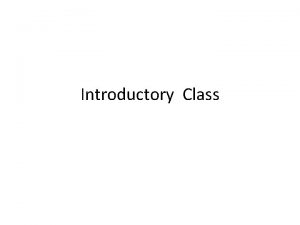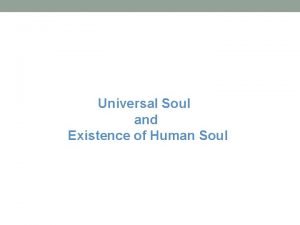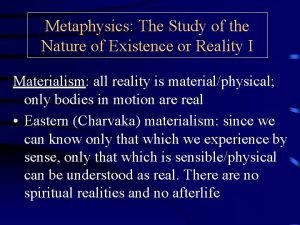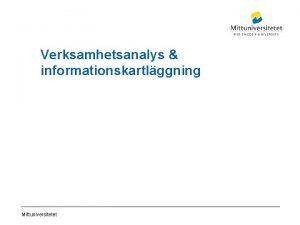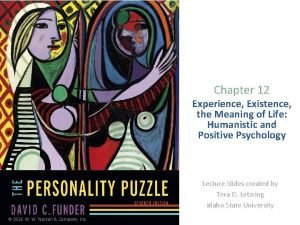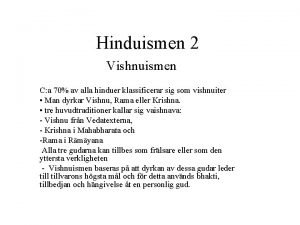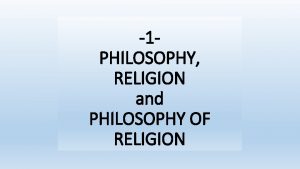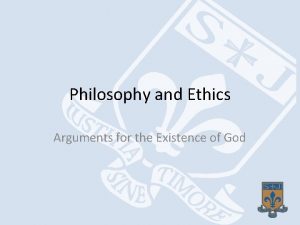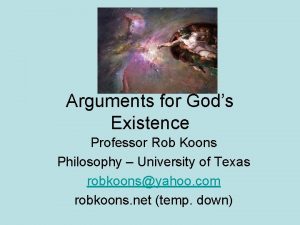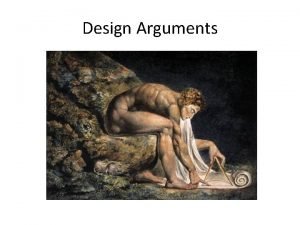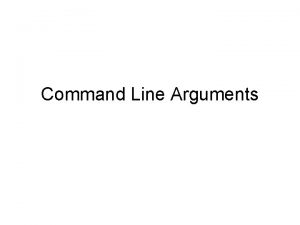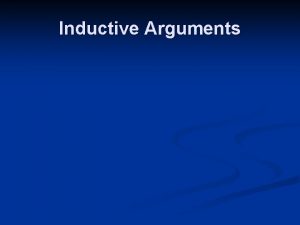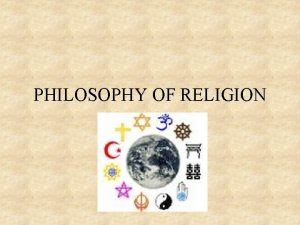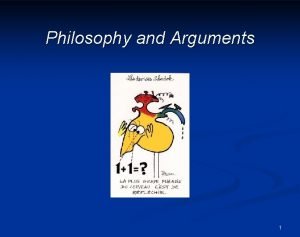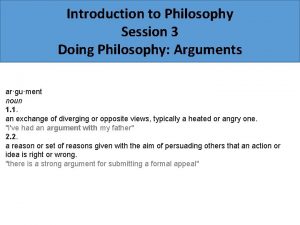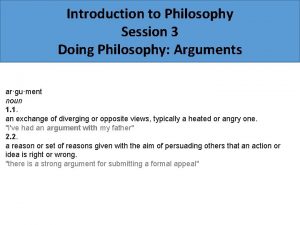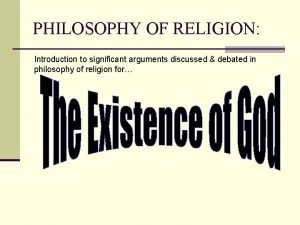Philosophy of Religion Arguments for the existence of
















- Slides: 16

Philosophy of Religion Arguments for the existence of God Assuming that God is real, what would be the best way to prove his existence?

Philosophy of Religion Arguments for the existence of God • I can explain what inductive proofs are and the concept of ‘a posteriori’ • I can explain St Thomas Aquinas’ Cosmological argument (Aquinas’ first Three Ways - motion or change; cause and effect; contingency and necessity)

a posteriori, inductive arguments • The cosmological argument is an a posteriori, inductive argument. • A posteriori = a statement based on observation, evidence, experience • Inductive proof = argument based on evidence / experience and that reaches a probable conclusion based on this evidence http: //study. com/academy/lesson/inductive-and-deductive-reasoning. html A: I have seen many quite swans. B: All my friends have seen lots of white swans. B: I have never seen a swan which is not white. C: Therefore all swans are white.

The Cosmological Argument • • • The cosmological argument is an a posteriori, inductive argument. Asks WHERE DID UNIVERSE COME FROM? ‘cosmos’world or. THE universe as a system Title for a collection of arguments which attempt to prove that God exists Evidence: the existence of the universe. • All ask fundamental question: can the universe offer a complete explanation for itself, or does it look beyond itself for an explanation? • • Where have we seen this argument before? A posteriori • What makes it a posteriori and inductive?

‘God’s effects…are enough to prove that God exists, even if they may not be enough to help us comprehend what He is. ’ • https: //www. youtu be. com/watch? v=Tg isehu. GOy. Y https: //www. youtube. com /watch? v=yyi. Nb. Jlqc. Jo Mr. Mc. C outline

The First Way: motion / change • Observation of the universe tells us that things tend to be in a state of motion / change. For example… • Nothing moves of its own accord but are ‘moved’ (changed) by something else. • So something must have started off the whole sequence – this must be outside the universe and something which is incapable of being moved by anything else i. e. the unmoved mover • ‘that which all men call God’ • To move from potentiality to actuality, an efficient cause is required = something already possessing a state of actuality = God

The First Way: cause and effect • Observation of the universe tells us that everything is subject to the law of cause and effect • Nothing can cause itself – logically impossible • This chain of cause and effect cannot be infinite – in the sense of a hierarchy • There must be a first, uncaused cause = God • Why is this? Quote bottom of p. 8 • The efficient (1 st) causes the intermediate cause (2 nd) which causes the ultimate (3 rd) cause

The Third Way: contingency and necessity • Everything that exists is contingent – it has the possibility of not existing & depends on something else for its existence • If this was true of everything then nothing would ever have come into existence which means there would be nothing now – but this is not true • In order for contingent beings to exist, there must be a necessary being that caused everything else = God

1. a) Explain each of Aquinas’ three ways in your own words. b) Highlight the main point he is making for each ‘way’. 2. What example did Aquinas give to explain how things with potentiality become actual? 3. P. 8 Key Quote Why does Aquinas say that nothing can move itself? Challenge: Can you think of any flaws in the cosmological argument?

Independent Learning 1. • What are the strengths of inductive arguments? • What are the weaknesses? • Explain how the strengths and weaknesses apply to the cosmological argument. Help can be found: Text book p. 13 2. What are the weaknesses of the cosmological argument?

The Kalam Argument (Craig) 1. Everything that begins to exist has a cause of its existence. 2. The universe cannot be an actual infinite because the present could not exist in an actual infinite universe / these are self-contradictory. 3. The universe began to exist. 4. Therefore, the universe has a cause of its existence. 5. Since no scientific explanation can provide a causal account of the origin of the universe, the cause must be personal – a personal agent.

Challenges to the cosmological argument • I can explain - Hume’s empirical objections and critique of causes - alternative scientific explanations including Big Bang theory • I can evaluate - How effective these challenges are - Whether cosmological arguments for God’s existence are persuasive in the 21 st Century. - the extent to which the Kalam cosmological argument is convincing

Critique of causes • All knowledge comes from sense experience • This means that a) We can’t speak meaningfully about the creation of the universe – we WEREN’T THERE b) We often imagine causal relations between events – we observe B always follows A and assume that A caused B • Hume challenges us to consider any one event and meditate on it; for instance, a billiard ball striking another. He holds that no matter how clever we are, the only way we can infer if and how the second billiard ball will move is via past experience. c) Even if things are caused, causation need not apply to the universe itself. d) Even if the universe was caused, we have no evidence to determine that the cause was the God of Classical Theism.

Bertrand Russell The concept of a necessary being (Aquinas’ Third Way) is meaningless – where does this category of necessity come from? ‘Just because every human has a mother doesn’t mean the whole of humanity has a mother. ’ (The fallacy of composition) ‘I should say that the universe is just there, and that’s all. ’

Is the cosmological argument convincing? Yes Is this a good argument? Aquinas Kalam Inductive arguments In the 21 st century No Is this a good argument?

 Gst 113
Gst 113 Types of arguments in philosophy
Types of arguments in philosophy Western religion vs eastern religion
Western religion vs eastern religion Klädsel i rom
Klädsel i rom The universal soul has been referred to as
The universal soul has been referred to as Study of the nature of existence
Study of the nature of existence Vätsketryck formel
Vätsketryck formel Verksamhetsanalys exempel
Verksamhetsanalys exempel Explanation experience existence exciting
Explanation experience existence exciting Iso 22301 utbildning
Iso 22301 utbildning Texter för hinduer tantra
Texter för hinduer tantra Personlig tidbok
Personlig tidbok Redogör för vad psykologi är
Redogör för vad psykologi är Etik och ledarskap etisk kod för chefer
Etik och ledarskap etisk kod för chefer Verktyg för automatisering av utbetalningar
Verktyg för automatisering av utbetalningar Tack för att ni lyssnade
Tack för att ni lyssnade Jiddisch
Jiddisch
